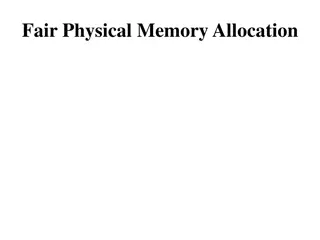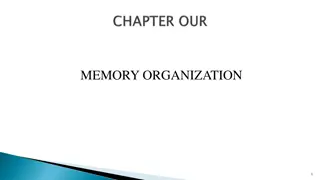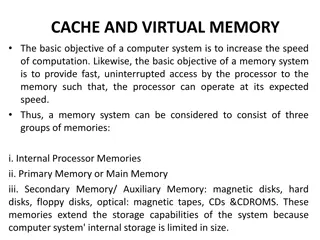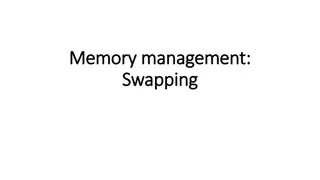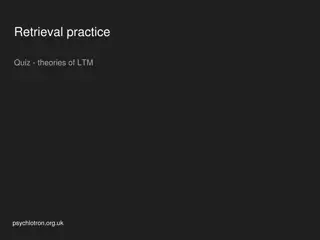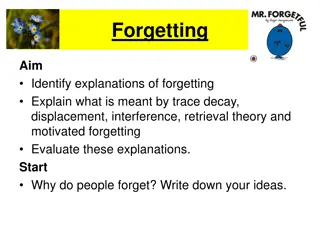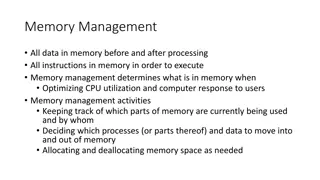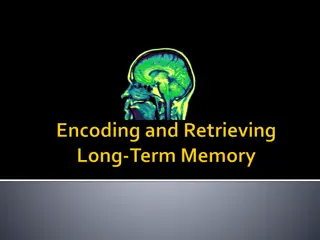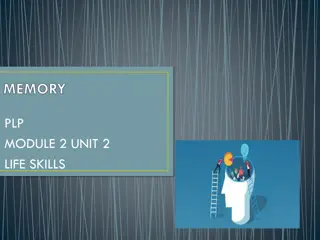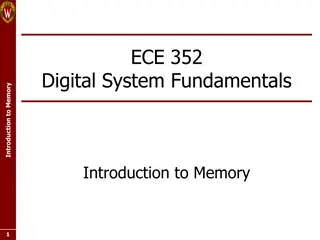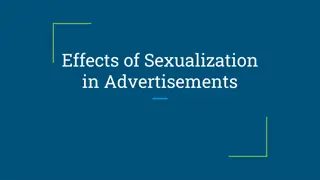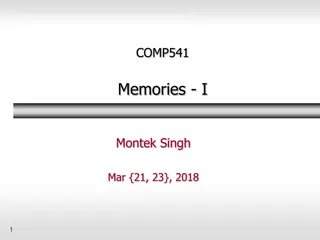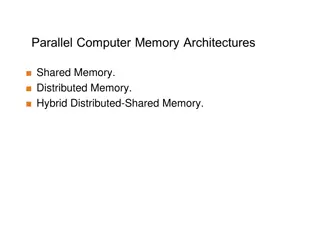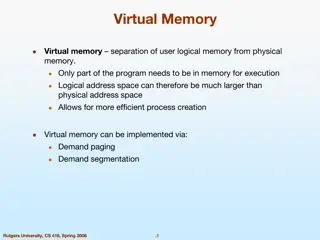Understanding Forgetting: Theories and Influence on Memory Recall
Forgetting is a complex phenomenon influenced by theories such as Decay Theory, Interference Theory, and Motivated Forgetting. The Ebbinghaus forgetting curve highlights how memories fade over time. Decay Theory suggests memories decay over time, while Interference Theory explains how old and new memories can disrupt each other. Proactive interference occurs when old memories hinder new learning, while retroactive interference involves forgetting old information due to new learning. Critical evaluations suggest that various factors beyond time affect memory recall.
Download Presentation

Please find below an Image/Link to download the presentation.
The content on the website is provided AS IS for your information and personal use only. It may not be sold, licensed, or shared on other websites without obtaining consent from the author. Download presentation by click this link. If you encounter any issues during the download, it is possible that the publisher has removed the file from their server.
E N D
Presentation Transcript
What is forgetting? Ebbinghaus forgetting curve Theories of forgetting Decay Theory Theory of Interference Retrieval Theory Theory of Inhibition Motivated Forgetting
Decay theory Memories leave a trace in the brain. Any physical and chemical changes in the brain results in a memory "trace." Trace decay theory states that forgetting occurs as a result of the automatic decay or fading of memory trace, the events that happen between the formation of a memory and the recall of the memory have no impact on recall. Hermann Ebbinghaus in 1885, Ebbinghaus forgetting curve
Critical Evaluation Not all memories follow the forgetting curve as there could be various other factors in play, such as noise and other environmental factors. that it is difficult to demonstrate that time alone is responsible for declines in recall. what happened during the time is crucial (Jenkin and Dalenbach, 924). A study by Minami and Dalenbch(1964) on cockroaches Why some memories fade quickly while others linger. Memories of shocking events like 9/11 attack, Boston bombing, etc are imprinted in our memory
Theory of Interference Proactive interference Retroactive interference Example Evaluation
Proactive interference (pro=forward) occurs when Proactive Interference you cannot learn a new task because of an old task that had been learnt. where old memories disrupt new memories. Learning a new phone number or locker combination If you move into a new house writing your old address A native English speaker who is trying to learn French Proactive interference is when older memories interfere with the retrieval of newer memories. Proactive interference can sometimes make it more difficult to learn new things.
Retroactive interference Retroactive interference (retro=backward) occurs when you forget a previously learnt task due to the learning of a new task. where new memories disrupt/interfere with the retrieval old memories. This type of interference creates a backward effect, making it more difficult to recall things that have been previously learned A musician might learn a new piece A teacher learning the names of her new class of students Recalling the information learned shortly than the material t learned earlier
Critical Evaluation Interference theory tells us little about the cognitive processes Baddeley (1990) states that the tasks given to subjects are too close to each other andthatdoes not happen in real life There is no doubt that interference plays a role in forgetting, but how much forgetting can be attributed to interference remains unclear (Anderson, 2000).
The Retrieval Failure Theory Two of the basic reasons for this failure in memory retrieval are related to encoding failures and lack of retrieval cues. Such information is said to be available (i.e. it is still stored) but not accessible (i.e. it cannot be retrieved). It cannot be accessed because the retrieval cues are not present This is known as Cue-Dependent Theory of Forgetting.
Retrieval cues can be: External/contextual cues present in the environment, setting, situation Internal/state dependent cues referring to the internal state of the individual
External/contextual cues Evidence indicates that retrieval is more likely when the context at encoding matches the context at retrieval. An experiment by Tulving and Pearlstone (1966) asked participants to learn lists of words belonging to different categories Baddeley (1975) experiment on deep-sea divers
Internal/state dependent cues Memory will be best when a person's physical or psychological state is similar at encoding and retrieval. Mood state at learning and at retrieval is the same is generally known as mood-state-dependent memory. A study by Goodwin et al. (1969) investigated the effect of alcohol on state-dependent retrieval. Recalling the hiding place is easy when drunk than when they were sober.
Theory of Inhibition Forgetting of information due to the inhibition produced by the information we don t try to remember Brown(1968) recalling the names of 50 states of US. Anderson and Spellman,1995
Motivated Forgetting Motivated forgetting arises from strong motive or desire to forget, usually because the experience is to disturbing or upsetting to remember. The motivated forgetting theory was invented by Sigmund Freud. The two types of motivated forgetting are repression (unconsciously) and suppression (consciously).
Elimination of memories from the consciousness What is too painful to remember, we simply choose to forget. Featured mainly in dramatic trials about early childhood sexual abuse Careful questioning, suggestive techiniques by trained therapists.
Little scientific evidence to support the theory as most evidence is based on case studies Therapists often suggest such memories in a subtle and unintentional way Being influenced by media reports, person suffering from psychological problem conclude the cause as early sexual abuse and repressed memories People often generate false memories for events that never happened(Goodman et al., 1996). Study by Ceci,1995
Amnesia Amnesia is a form of memory loss stemming from illness, injury, drug abuse, or other causes. Some people with amnesia have difficulty forming new memories. Others can t recall facts or past experiences. People with amnesia usually retain knowledge of their own identity, as well as motor skills.
Types Retrograde amnesia Loss of memory of events that occurred prior to an amnesia-inducing event Anterogradeamnesia Inability to store information that occur after amnesia inducing event. When you have anterograde amnesia, you can t form new memories. Transient global amnesia Infantile amnesia Most people can t remember the first three to five years of life.
Causes of amnesia Dementia Anoxia A depletion of oxygen levels can also affect your entire brain and lead to memory loss. Damage to the hippocampus Your hippocampus is a part of the brain and limbic system responsible for memory. Head injuries Traumatic head injuries, as well as stroke, tumors, and infections, can also cause damage to your brain. Alcohol use Short-term alcohol use can cause blackout. Trauma or stress Severe trauma or stress can also cause dissociative amnesia. Electroconvulsive therapy
Case study of S.P. Case study of S.P.(Schnider,1994): An example of the dissociation between working memory and Long-term memory S.P. , a 66 yr old suffered from stroke, affected medial temporal lobe of hippocampus Showed profound anterograde amnesia, could not enter information to long term memory Could recognize his family members, retained the ability to acquire procedural memory Hippocampus transforms the information from working memory to more permanent store LTM
Case study of Clive Wearing Case study of Clive Wearing: The temporal lobe and semantic memory C.W., A musician caught infectious encephalities causing damage to frontal lobe and hippocampus causing memory deficit which was recorded by wife Deborah Deficits involved semantic memory
Korsakoffs Syndrome Consumption of large amount of alcohol for many years Sensory motor problems, heart, liver, gastrointenstinal damage Both anterograde and severe retrograde amnesia Extensive damage to thalamus and hypothalamus
Alzheimers Disease Most tragic disorder during the closing decades of life 5% of the people over age 65 experience it Statrtswith mild memory problem, gradually they become totally confused and unable to perform simple tasks like dressing or grooming themselves Later they fail to recognize their family members Suffers from wide range of memory impairment- WM,SM, EM, memory for skills, autobiographical memory all get disturbed
Cause The brain contains tangles of amyloid beta protein which is not found in normal brain(low concentration This damages the neurons that projects from the neclei in the basal forebrain to hippocampus and cerebral cortex These neurons transmit information by means of the neurotransmitter acetylcholine a substance that plays key role in memory A patients contains lower than normal amounts of acetylcholine










